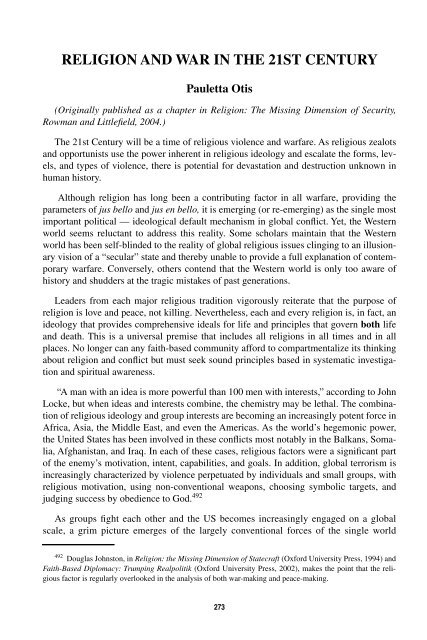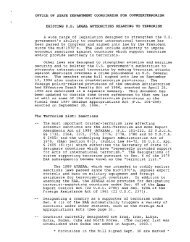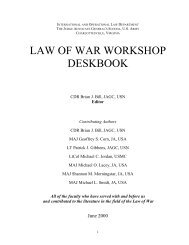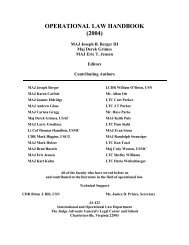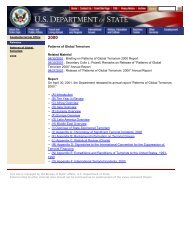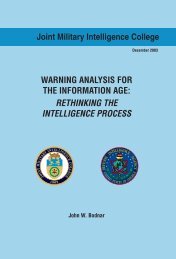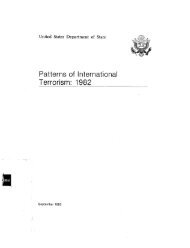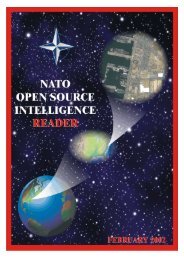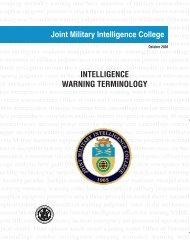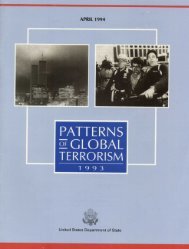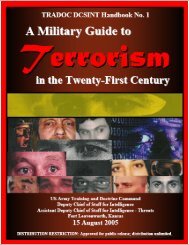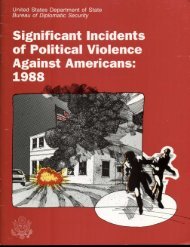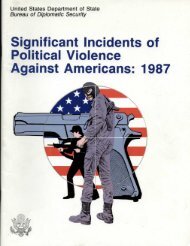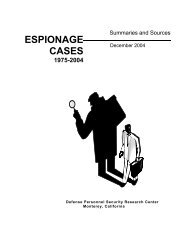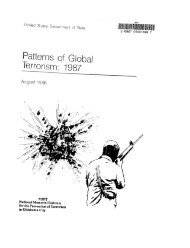learning with professionals - Higgins Counterterrorism Research ...
learning with professionals - Higgins Counterterrorism Research ...
learning with professionals - Higgins Counterterrorism Research ...
Create successful ePaper yourself
Turn your PDF publications into a flip-book with our unique Google optimized e-Paper software.
RELIGION AND WAR IN THE 21ST CENTURY<br />
Pauletta Otis<br />
(Originally published as a chapter in Religion: The Missing Dimension of Security,<br />
Rowman and Littlefield, 2004.)<br />
The 21st Century will be a time of religious violence and warfare. As religious zealots<br />
and opportunists use the power inherent in religious ideology and escalate the forms, levels,<br />
and types of violence, there is potential for devastation and destruction unknown in<br />
human history.<br />
Although religion has long been a contributing factor in all warfare, providing the<br />
parameters of jus bello and jus en bello, it is emerging (or re-emerging) as the single most<br />
important political — ideological default mechanism in global conflict. Yet, the Western<br />
world seems reluctant to address this reality. Some scholars maintain that the Western<br />
world has been self-blinded to the reality of global religious issues clinging to an illusionary<br />
vision of a “secular” state and thereby unable to provide a full explanation of contemporary<br />
warfare. Conversely, others contend that the Western world is only too aware of<br />
history and shudders at the tragic mistakes of past generations.<br />
Leaders from each major religious tradition vigorously reiterate that the purpose of<br />
religion is love and peace, not killing. Nevertheless, each and every religion is, in fact, an<br />
ideology that provides comprehensive ideals for life and principles that govern both life<br />
and death. This is a universal premise that includes all religions in all times and in all<br />
places. No longer can any faith-based community afford to compartmentalize its thinking<br />
about religion and conflict but must seek sound principles based in systematic investigation<br />
and spiritual awareness.<br />
“A man <strong>with</strong> an idea is more powerful than 100 men <strong>with</strong> interests,” according to John<br />
Locke, but when ideas and interests combine, the chemistry may be lethal. The combination<br />
of religious ideology and group interests are becoming an increasingly potent force in<br />
Africa, Asia, the Middle East, and even the Americas. As the world’s hegemonic power,<br />
the United States has been involved in these conflicts most notably in the Balkans, Somalia,<br />
Afghanistan, and Iraq. In each of these cases, religious factors were a significant part<br />
of the enemy’s motivation, intent, capabilities, and goals. In addition, global terrorism is<br />
increasingly characterized by violence perpetuated by individuals and small groups, <strong>with</strong><br />
religious motivation, using non-conventional weapons, choosing symbolic targets, and<br />
judging success by obedience to God. 492<br />
As groups fight each other and the US becomes increasingly engaged on a global<br />
scale, a grim picture emerges of the largely conventional forces of the single world<br />
492 Douglas Johnston, in Religion: the Missing Dimension of Statecraft (Oxford University Press, 1994) and<br />
Faith-Based Diplomacy: Trumping Realpolitik (Oxford University Press, 2002), makes the point that the religious<br />
factor is regularly overlooked in the analysis of both war-making and peace-making.<br />
273


